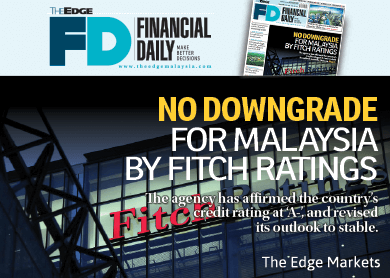
KUALA LUMPUR: Fitch Ratings has revised the outlook on Malaysia’s sovereign rating to “stable” from “negative”, and affirmed the country’s long-term foreign currency Issuer Default Rating (IDR) at “A-”, with local currency IDR at “A”.
The review is in sharp contrast to the market’s expectation of a downgrade by as much as two notches on Malaysia’s credit rating following the rating agency’s earlier remark in March that it may do so because of a worsening trade balance and that a state investment company was struggling to meet debt obligations.
Fear of the downgrade has dampened equity market sentiment and sent the ringgit to a near 10-year low earlier this week.
In a statement released late last night, Fitch said Malaysia's fiscal finances have improved since last year with the general government deficit falling from 4.6% of gross domestic product (GDP) in 2013 to 3.8% of GDP in 2014, and general government debt-to-GDP ratio declining from 54.7% at end-2013 to 53.9% at end-2014, as per Fitch’s estimates.
Fitch views the progress on the goods and services tax (GST) and fuel subsidy reform as supportive of the country’s fiscal finances. A further narrowing of the deficit is forecast in 2015, despite lower oil prices.
“Nevertheless, as against the A median, Malaysia's fiscal position continues to remain weak. General government debt as a share of GDP at the end of 2014 was 53.9%, which is still above the A median of 47.2%,” Fitch noted.
The rating agency opines that Malaysia's rating remains supported by reasonably strong real GDP growth rates and low inflation volatility. Malaysia's five-year real GDP growth averaged 5.8% over 2010 to 2014, as against 3.1% for the A median, whereas inflation volatility was 1.3% as against 1.7%.
Meanwhile, Fitch noted that federal government debt and explicit guarantees continue to increase. Total federal government explicit guarantees as at end-2014 rose to 16% of GDP from 15.4% a year earlier.
“Fitch continues to believe that the Malaysian sovereign is incurring additional contingent liabilities beyond explicit guarantees because of quasi-fiscal operations of state-owned entity 1MDB (1Malaysia Development Bhd). Fitch thinks there is a high probability that sovereign support for 1MDB would be forthcoming if needed,” the statement said.
This article first appeared in The Edge Financial Daily, on July 1, 2015.